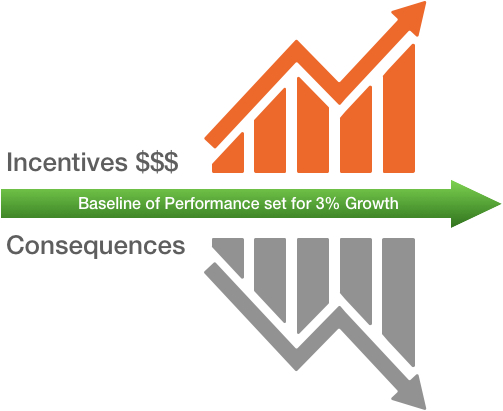
Survive, Thrive or Die – Lessons in Accountability
With no consequences, poor performance becomes the standard. As a leader it’s not what you preach, it’s what you tolerate. Set expectations and hold people to them. -jockowillink
*HR Disclaimer: Adhere to state and federal labor laws and regulations to protect employees and their rights in the workplace. This article expresses an opinion based on the fundamental principles of competition and capitalism.
There is a massive chasm between employees and business owners perception of reality simply because all business owners have lived the life of an employee, however employees have never lived the life of a business owner.
This article targets small business owners and corporate executives with less than 100 employees who frequently grapple with the challenging aspect of accountability in running their businesses. In today’s culture wars, social media, and regulatory landscape, the very word “accountability” may face uncertain inclusion in future editions of Webster’s Dictionary.
Through my firsthand experience of starting small businesses in Nicaragua, Central America, navigating accountability within a contrasting culture, language, and significantly lower education levels provided valuable insights. Humans are more or less the same everywhere when it comes to accountability because accountability is all about dealing with human nature.
The bottom line is that keeping poor performers on the payroll is arguably the worst thing a business owner can do for their business and for the employee. The long-term outcomes are all negative if the intention is for both the business and the employee to flourish. Tough love and ownership are necessary for the employees, while a company culture of continual process improvement and accountability is required for the business to ensure profitability and business growth.
Accountability is About Personal Risk
Most of the time, tolerating poor performance occurs when managers, team leaders, and executives do not have enough of their own self-worth, identity, social status or life savings at risk to take immediate corrective action. Without the risk of personal consequences for the decision-makers, a sense of urgency to take action is lacking and it leads to a high overhead, inefficient, glorified daycare-center for adults.
The individual who started their own business with their own money “get it” on a whole other level; their savings, investment, and well-being for their family are on the line (at risk). There is literally no one else who is going to get it done; survive, thrive or die.
It wasn’t until I started several different businesses of my own that I learned this valuable lesson. With my own net-worth on the line, it became obvious, I was seriously motivated to ensure the business succeded. I took immediate action, called audibles, hustled and most importantly, did not accept poor performance from anyone.
Look inward, ask yourself, “If my net-worth was on the line, would I have a higher sense of urgency to take action to ensure my company comes out of this swinging? What would I do today, tomorrow and next week if I am about to lose my savings, retirement, and house if this business doesn’t survive?”
Entitlement is Enemy #1
As you know, normally, one has to royally screw up to legally lose their job which weakens the risk of that consequence ever becoming a reality. This dynamic is the current that flows against accountability, which makes it so difficult to actualize. A workplace that is highly resistant to process change manifests because there’s no fear of losing one’s job and very few have the DNA flowing in their veins to perform brilliantly without anyone telling them to stop loafing around.
The 80/20 rule and the 20/60/20 bell curve creeps into companies with poor accountability. On the far right of the bell curve, you have 20% of the workforce that live to work and deliver 80% of the work per the 80/20 rule (exceptional performers). The other 20% way on the left side of the bell curve do just enough to keep their jobs (paycheck players), and the middle 60% are putting their time in without trying to excel (work is important, but so is family and other interests).
When the business has plenty of sales and revenue…poor performance, efficiency, and high overhead are noise in the background and when sales are consistently down or a worldwide pandemic hits, they become front and center.
Be a stand-up leader and care for the well-being of your employees by holding them accountable. You are doing them a disservice by allowing them to be a paycheck player or act entitled. By choosing to ignore the problem, ultimately you will have played a part in their endless struggle to achieve success. It’s irresponsible to allow the 20% on the left of the bell curve to exist, reject the entire theory and create a 60/40 split.
Then, adopt the Six Sigma creed to help everyone; process dictates performance as long as you have the executioners in place and practicing sound accountability.
What About Incentives for Accountability?
Incentives give birth to entitlement when used incorrectly. Our nature is to want to reward others for their good work and we erroneously think that holding others to their word is best done with a reward, which is basically a bribe. A good example to use is telling a kid that you’ll give them a candy bar for cleaning their room. Bad idea if this is the baseline expectation, once the candy bar is given as an incentive, it’s psychological reward value drops the next time and so on, because it’s “expected”.
There is a hard line to establish in every employee’s role and position. It’s a baseline of performance and under that baseline is the world of accountability and consequences. Above it is the world of incentives. Incentives help pull employees up in the direction of doing more, being proactive, and taking on additional workload or projects that are above the baseline.

Consequences hold the baseline of performance and incentives pull one to perform above it. For the kid who must clean the room, cleaning it on a schedule and to a specific quality standard is the baseline performance, no reward/candy, just a healthy dose of free playtime per day (paycheck). If the kid skips a day or does a poor job at it, then a consequence is needed to ensure the baseline performance objective is met; stay in his room all day without his toys for example (consequence). If you want the kid to not only clean the room but go over the baseline and re-organize the closet, now offer the candy bar as a reward.
Once this mindful practice is started, it’s incredible how effective and less frustrating accountability for adults can be. Careful, ensure your baseline is not the bare-minimum performance, and rather the performance required to ensure profitability and growth; too often we set the baseline as the bare minimum.
Example 1: The baseline set for the welder is to ensure that his work is completed ahead of schedule with a 20% buffer for emergency and unforeseen gotchas. That’s the baseline of expectations/performance to be referenced for future accountability. By collaborating with the welder to improve the process (continuously) to improve the performance, the reward/incentive can come in forms of an increased wage, privileges, profit sharing and more, pick your juicy fruit.
Example 2: The inside salesperson must pull-in $200k each month, which will put the company on track for a 3% growth rate for that product; set that as the baseline of performance.
In both examples, there need to be consequences to ensure the baseline is met and reward for continual improvement to perform above it. Like a trailing stop loss when trading the markets, the baseline performance level should ratchet up over time, as should the employee’s well being, compensation, privileges, and rewards.
What Kind of Consequences Are Effective?
Changing company culture when there is job security is more challenging than a bipartisan climate change bill passing on Capitol Hill. Don’t approach this like a lawyer or banker trying to leverage other’s into your bidding, that’s gross. Be pragmatic, understand human nature and respectfully assert accountability by three universal levers of consequence.
Everyone is motivated by status, approval from others and financial loss. Focusing on these three levers when imparting consequences for accountability is the key.
First, when overall business performance is poor and revenues are down, use the consequence of job-loss for accountability. It is a scenario where businesses simply can’t afford the extra overhead. Star players are keepers, paycheck players are jeepers and put on notice.
The 3 Levers of Consequence: Status/Approval, Privileges, & Financial
There’s a flow to it. You do not start slashing tires out the gate. Tough love, it’s all about tough love.
- “Gaming“ performance can be effective for managers, team leaders, and key positions where status and approval matters. Nobody wants to be known as the leader of the loser team and when everyone can see one’s actual performance, they feel motivated in fear of not being approved by their peers. And guess what? It works. In addition, there is a positive feedback loop created as those all-star performers are recognized, pulling others up like inverse gravity. And guess what else? The overall maturity of your company improves as everyone must learn how to win and lose with grace, together.
- Privileges are everywhere in the workplace. Remote working, time-off requests, overtime, vacation, benefits, compensation plans, and the list goes on. Taking away privileges can be a very powerful tool of accountability. Simply removing the freedom to come and go from the workplace when others can is my personal favorite. Temporarily freezing privileges that are not maintaining the baseline of performance and giving them to those that hold the line is impressive in its effectiveness.
- Having “skin in the game” is a more proactive and effective way to impart financial consequences for poor performance amongst the executive and VP groups. Similar to buying into a partner position at a law firm, buying into positions and a seat at the table always works; there’s plenty of ways to approach it. The sense of urgency a business partner will have when they have 10%, 30% or 50% of their net-worth on the line is intense compared to an Operations Manager with a $150k salary and benefits galore. Seriously, who is more motivated?
What about that welder you need every single day to perform so production stays on track to meet the OTD obligations to the customer? Start with documented disapproval and investigation into the causes in a scrum type meeting environment where status/approval is at risk; then reduce privileges, then comes the pain of job loss. However, if you are at the point of imparting job-loss consequences, you might have totally screwed up, so take responsibility and create a fresh start with them (Second Chance) while seeking a replacement and making sure they know about it.
Teach Business Fundamentals With Performance Funds $$$
Whether it’s a team of laborers or a team of VPs, creating a performance fund is effective and fun. It is a way to impart accountability through consequences of financial loss and provide incentives for financial gain while simultaneously pegged to the team’s performance. Each individual can deposit money or exchange their vacation time, and/or sick leave as an investment into the fund that the company matches at a percentage rate that makes sense. However, with agreed-upon performance levels and goals, the fund grows or shrinks based on performance. Most importantly, it must be set-up such that it can quickly go negative if performance is not maintained above the baseline.
It’s basically a derivative of the company/team’s business performance so when the company/team loses, the team members lose too, as they should.
Example: Five managers exchange the value of their vacation time as a deposit into the team fund and the company matches 30%. This creates a total baseline value of $10k. When agreed performance goals are met, the company deposits money into the fund, when the performance falls short of the baseline, money is moved from the fund to the company balance sheet, and if it falls short enough times it can drop below the baseline and go negative. The trick is posting the fund balance every week in the workplace plus discussing how and why the fund’s value went up or down for the week based on the cause of fluctuation.
It becomes a powerful mechanism for teaching what matters most to the company, the nature of the business and how the business makes or loses money. Which is absolutely paramount to building an entire company marching towards profitability and growth.
I used this technique to resolve an elusive ten-year-long problem with a machine shop’s tool room. The company was throwing away about $3k in tooling a month and reducing productivity due to poor organization. It was permanently solved when a baseline performance standard was set, new processes implemented, and each employee had the risk of experiencing financial loss and the opportunity to work together to experience financial gain.
Unfortunately, 95% of those in the workplace truly do not understand the dynamics of business or have ever experienced it. Hence, business education is desperately needed. The performance fund teaches the nature of how business works and the cost to the company when performance is not met or mistakes are made. They experience the pain of their mistakes when the business feels it. This education is the catalyst for changing company culture and is desperately missing in today’s workplace.
Summary
We all can benefit from taking a healthy moment to look inward and honestly ask, “Have I been tolerating poor performance of myself and of others?” The job market, entitlement, and poor performance in the workplace are now experiencing a reckoning. Regardless of the reasons, the long term effects of tolerating poor performance within ourselves or of others eventually lead us and the business we are a part of in a direction further and further away from the very things we long for in life. Which is to flourish, to be of a healthy body and mind, to experience well being, have job security, to be valuable, and achieve a status level we are proud of in our community and workplace.
*Please share to raise awareness and motivate those we care about; their perseverance and resiliency depend on our support and tough love more now than ever.





